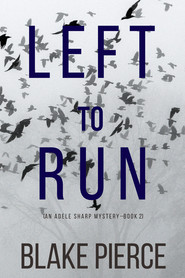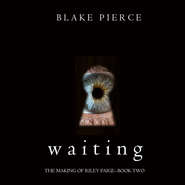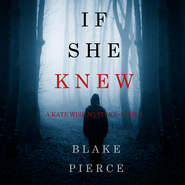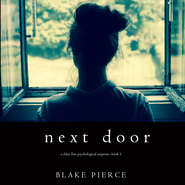По всем вопросам обращайтесь на: info@litportal.ru
(©) 2003-2025.
✖
Cause to Kill
Настройки чтения
Размер шрифта
Высота строк
Поля
“But you just said – ”
“Nobody likes you,” he emphasized in earnest. “My people can’t think we’re buddies. Hard enough being a black man out here. How about this: I’ll have my people take care of this crime scene. We’ll get the body to our coroner, try to figure out who she is and have forensics sweep the area. What’s your number? Whisper it to me. Whisper…”
Avery whispered her number and Talbot made a nasty face, like he was taking down the digits of her supervisor so she could be reprimanded.
“I just called you,” he said. “There it is… Now you have my number too. Once I hear back from everyone on my team. I’ll send you a detailed report. Not happy? Talk to your captain, and have him call my captain, but I can tell you this already: this shit happened in my town this time, and that means Belmont police are involved. You wanna help me out? Share what you got?”
“Sure,” she said, “we can do that. I’d also want my team to view the body and consult with your coroner.”
“No problem.”
“And I want complete access to this crime scene.”
“You got it. We good?”
“Yeah,” she said and frowned, “I think.”
“I don’t give a shit what you think!” Talbot yelled and backed up so everyone could hear. “That’s just the way it is, Black!”
CHAPTER TWENTY FOUR
Talbot walked away right after his trash-talk to consult with his team. Most of the Belmont cops flashed nasty looks at Avery, or shook their heads. One of them could be heard saying, “Why do we have to share shit? This is a Belmont crime.”
Avery took her time to walk around the area.
She stared at the body from multiple perspectives. Everyone ignored her, but every so often she could hear mothers screaming from beyond the gates, or hear reporters calling out questions.
A sense of the killer had begun to inhabit Avery. It had started in Lederman Park, and then at the cemetery, a feeling that she understood him somehow. He’d chosen quiet places, respectful places for dead. This one was different. Although the girl was placed in a park among trees and woods, it was a children’s park, which had a more excitable energy than a cemetery or a bench near the river.
Why here? she wondered.
The visual of the girl, too, was different: she viewed multiple children, different genders and colors.
Something happened, she thought.
What changed?
Forensics and the coroner’s report would be able to tell her if there were differences within the body or at the crime scene, but even if they found nothing, Avery was certain about her instincts. After working on cases involving killers for years – and before killers, on cases involving sleazy people in general as an attorney – she’d become an expert on subtle differences within people, and at crime scenes.
Alone, with no new leads, an abysmal morning and with protestors, parents, and Belmont police glaring at her like she was an unwanted guest, Avery put her head down and headed back to the car.
Her arrival at the A1 office was the perfect topping for a terrible day. The moment the elevator doors opened and Avery was seen, the entire office went silent. Sneers were on their faces. Jones shook his head and looked away and Thompson turned his back on her. Not a single nasty joke or laugh only made it worse.
Finley was at his desk. Slightly more empathetic than the rest of his department, he offered a sympathetic glance and lowered his head.
The morning paper, with her scandalous article about the visit with Howard Randall, was on a number of desks, and a few computer screens showed a similar picture of Avery, crying in her car outside the prison.
“Black,” someone called, “get in here.”
O’Malley waved from his office.
Connelly stood up.
“No. No,” O’Malley pointed. “Not you. Just Black.”
“This is my case,” Connelly argued.
“If you want to keep it that way, you’ll sit down and shut up.”
Connelly stood defiantly and pushed out his chest.
“Am I in trouble?” Avery asked.
“Come on in.” O’Malley waved and closed the door behind him. “What makes you think you’re in trouble, Black? You tell me.”
“I don’t know,” she said. “I went to see Howard Randall for a lead. He gave me one, well, not a good one, but a connection between those girls. He knew something.”
A deep sigh came from O’Malley.
“What could Howard Randall possibly know about your case?” he said. “The guy’s in jail. All he knows is what he reads in the paper.”
“He has the mind of a killer,” Avery insisted. “He thinks like our guy.”
O’Malley frowned.
“Stop,” he said, “stop, please. Listen to me, Avery. I like you. I saw you do some amazing things on the beat: fearless, dedicated, honest, and most of all, smart. Other people saw it too. They might give you shit but that’s because they’re jealous and afraid. People are afraid of what they don’t understand, and I’m beginning to feel that fear.”
“Captain, what are you – ”
A palm stopped her.
“Please,” he said, very calm, almost torn, “let me finish. This case, it’s a big one. Bigger than I thought. We’ve got bodies spread out over three counties so far, three dead girls, no further leads, and a lot of pissed off people. You’re an animal, Avery. I see it. I see it even now. You’re consumed by this case. You really want to find this guy, so bad that you’ve been making some really stupid rookie mistakes.”
He held up a finger.
“One,” he said, “you harassed a civilian this morning in Cambridge.”
“I had reason to believe – ”
“I don’t care what you believed,” he yelled. “You accosted a man in an art shop, a very well-connected man, I might add, a man that’s already been through the wringer a hundred times because of his past. Guy had a breakdown after you left. Tried to commit suicide in the bathroom. His boss had to tear down the door. Ambulance was called. Then he called me, and he called the chief, and he called the mayor. And do you know what he said? He said we allowed a psycho to lead this case. Luckily, he hasn’t pressed charges, yet.”
“Suicide?”
Avery lowered her head. The burning stare of Wilson Kyle came into her mind, and she remembered his passionate speech about Lang’s history.
“That was a mistake,” she said. “I didn’t mean to.”
“Two,” O’Malley said and held up two fingers. “You got yourself in the papers. Now, I know that’s not your fault. You walk around like you’re the only person in the universe half the time. Makes me wonder how you can possibly see anything, but you do. What you didn’t see were all these paparazzi scumbags having a feeding frenzy at your expense. The photo from the park I can handle. What I can’t handle is that picture from the prison. You went to see the most famous serial killer in Boston’s history, a man you got off, a man that then killed again in your name, and you didn’t think to ask? Or watch for cameras? Or to at least give me the heads-up so I could tell you you were nuts?”
“Nobody likes you,” he emphasized in earnest. “My people can’t think we’re buddies. Hard enough being a black man out here. How about this: I’ll have my people take care of this crime scene. We’ll get the body to our coroner, try to figure out who she is and have forensics sweep the area. What’s your number? Whisper it to me. Whisper…”
Avery whispered her number and Talbot made a nasty face, like he was taking down the digits of her supervisor so she could be reprimanded.
“I just called you,” he said. “There it is… Now you have my number too. Once I hear back from everyone on my team. I’ll send you a detailed report. Not happy? Talk to your captain, and have him call my captain, but I can tell you this already: this shit happened in my town this time, and that means Belmont police are involved. You wanna help me out? Share what you got?”
“Sure,” she said, “we can do that. I’d also want my team to view the body and consult with your coroner.”
“No problem.”
“And I want complete access to this crime scene.”
“You got it. We good?”
“Yeah,” she said and frowned, “I think.”
“I don’t give a shit what you think!” Talbot yelled and backed up so everyone could hear. “That’s just the way it is, Black!”
CHAPTER TWENTY FOUR
Talbot walked away right after his trash-talk to consult with his team. Most of the Belmont cops flashed nasty looks at Avery, or shook their heads. One of them could be heard saying, “Why do we have to share shit? This is a Belmont crime.”
Avery took her time to walk around the area.
She stared at the body from multiple perspectives. Everyone ignored her, but every so often she could hear mothers screaming from beyond the gates, or hear reporters calling out questions.
A sense of the killer had begun to inhabit Avery. It had started in Lederman Park, and then at the cemetery, a feeling that she understood him somehow. He’d chosen quiet places, respectful places for dead. This one was different. Although the girl was placed in a park among trees and woods, it was a children’s park, which had a more excitable energy than a cemetery or a bench near the river.
Why here? she wondered.
The visual of the girl, too, was different: she viewed multiple children, different genders and colors.
Something happened, she thought.
What changed?
Forensics and the coroner’s report would be able to tell her if there were differences within the body or at the crime scene, but even if they found nothing, Avery was certain about her instincts. After working on cases involving killers for years – and before killers, on cases involving sleazy people in general as an attorney – she’d become an expert on subtle differences within people, and at crime scenes.
Alone, with no new leads, an abysmal morning and with protestors, parents, and Belmont police glaring at her like she was an unwanted guest, Avery put her head down and headed back to the car.
Her arrival at the A1 office was the perfect topping for a terrible day. The moment the elevator doors opened and Avery was seen, the entire office went silent. Sneers were on their faces. Jones shook his head and looked away and Thompson turned his back on her. Not a single nasty joke or laugh only made it worse.
Finley was at his desk. Slightly more empathetic than the rest of his department, he offered a sympathetic glance and lowered his head.
The morning paper, with her scandalous article about the visit with Howard Randall, was on a number of desks, and a few computer screens showed a similar picture of Avery, crying in her car outside the prison.
“Black,” someone called, “get in here.”
O’Malley waved from his office.
Connelly stood up.
“No. No,” O’Malley pointed. “Not you. Just Black.”
“This is my case,” Connelly argued.
“If you want to keep it that way, you’ll sit down and shut up.”
Connelly stood defiantly and pushed out his chest.
“Am I in trouble?” Avery asked.
“Come on in.” O’Malley waved and closed the door behind him. “What makes you think you’re in trouble, Black? You tell me.”
“I don’t know,” she said. “I went to see Howard Randall for a lead. He gave me one, well, not a good one, but a connection between those girls. He knew something.”
A deep sigh came from O’Malley.
“What could Howard Randall possibly know about your case?” he said. “The guy’s in jail. All he knows is what he reads in the paper.”
“He has the mind of a killer,” Avery insisted. “He thinks like our guy.”
O’Malley frowned.
“Stop,” he said, “stop, please. Listen to me, Avery. I like you. I saw you do some amazing things on the beat: fearless, dedicated, honest, and most of all, smart. Other people saw it too. They might give you shit but that’s because they’re jealous and afraid. People are afraid of what they don’t understand, and I’m beginning to feel that fear.”
“Captain, what are you – ”
A palm stopped her.
“Please,” he said, very calm, almost torn, “let me finish. This case, it’s a big one. Bigger than I thought. We’ve got bodies spread out over three counties so far, three dead girls, no further leads, and a lot of pissed off people. You’re an animal, Avery. I see it. I see it even now. You’re consumed by this case. You really want to find this guy, so bad that you’ve been making some really stupid rookie mistakes.”
He held up a finger.
“One,” he said, “you harassed a civilian this morning in Cambridge.”
“I had reason to believe – ”
“I don’t care what you believed,” he yelled. “You accosted a man in an art shop, a very well-connected man, I might add, a man that’s already been through the wringer a hundred times because of his past. Guy had a breakdown after you left. Tried to commit suicide in the bathroom. His boss had to tear down the door. Ambulance was called. Then he called me, and he called the chief, and he called the mayor. And do you know what he said? He said we allowed a psycho to lead this case. Luckily, he hasn’t pressed charges, yet.”
“Suicide?”
Avery lowered her head. The burning stare of Wilson Kyle came into her mind, and she remembered his passionate speech about Lang’s history.
“That was a mistake,” she said. “I didn’t mean to.”
“Two,” O’Malley said and held up two fingers. “You got yourself in the papers. Now, I know that’s not your fault. You walk around like you’re the only person in the universe half the time. Makes me wonder how you can possibly see anything, but you do. What you didn’t see were all these paparazzi scumbags having a feeding frenzy at your expense. The photo from the park I can handle. What I can’t handle is that picture from the prison. You went to see the most famous serial killer in Boston’s history, a man you got off, a man that then killed again in your name, and you didn’t think to ask? Or watch for cameras? Or to at least give me the heads-up so I could tell you you were nuts?”

















